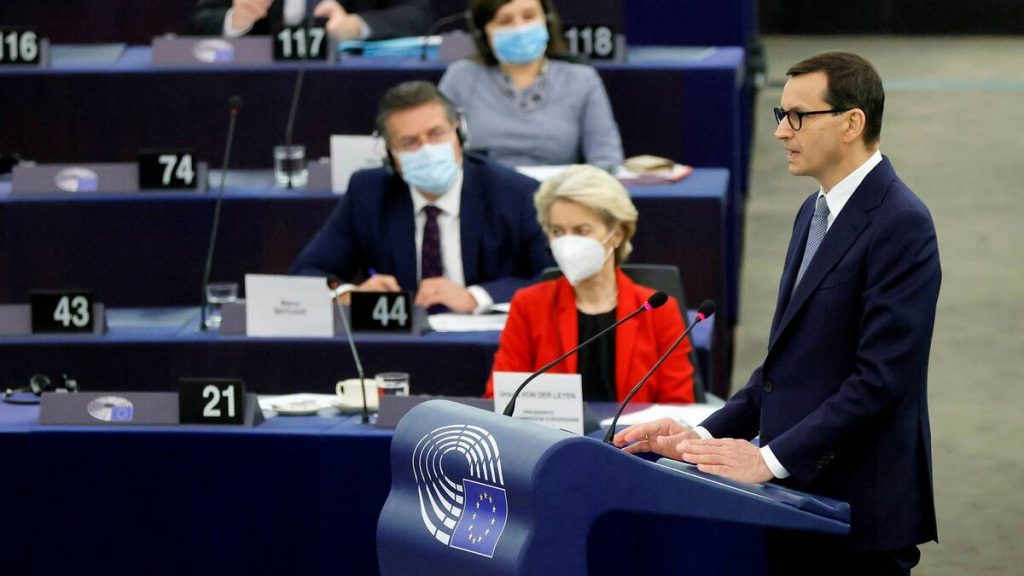Polish Prime Minister Mateusz Morawiecki arrived, on Tuesday, in Strasbourg to address the European Parliament.
European Commission President Ursula von der Leyen did the same, expressing grave concern about the decision of the Polish Constitutional Court, which rejected the primacy of EU law over the Polish constitution.
The Polish court’s decision came earlier this month, and was preceded by a report from the Polish government.
The court ruling in Warsaw, in turn, must be seen in light of the highly publicized ruling by the European Court of Justice in Luxembourg, which held that Polish courts are not independent and that the disciplinary tribunal for judges should be abolished. This happened after a report from the European Commission.
Thus, two courts rejected each other. This is taking place in a context in which Poland is described as a country moving in an undemocratic direction. This is a long-running battle between the European Commission and governments in the West on one side and the government of Poland on the other.
“The European Commission and the European Court of Justice must act,” Stefan Lofven said ahead of this week’s EU summit. But the conflict should not be at the court level.
In his speech, Mateusz Morawiecki listed a number of other cases in which national courts had conflicted with EU law. He also noted that in European countries, to say the least, there are disparate ways of judging constitutional issues and that judges are also appointed on very different principles. Some countries have constitutional courts, others do not. In some countries, judges are appointed by the government, and in others they are appointed by other judges. It is possible to debate whether all of Mateusz Morawiecki’s comparisons are reasonable, but as long as the dispute remains on a legal level, this type of reference should be considered appropriate.
It should also be noted that there is longstanding and widespread criticism of EU law. The Swedish Social Democratic government denounced the court’s decision in 2005 that the pharmacy monopoly should be abolished. Michel Barnier, a Brexit negotiator and EU commissioner who now aspires to become France’s president, recently stated that France should take back its legal sovereignty from the European Court of Justice.
But there is another dimension to the course of events, which is more political and principled. It’s about what kind of cooperation the EU should have. The Polish government’s dissatisfaction with the European Court of Justice is similar to British criticism of the court’s role, which served as an important backdrop to Britain’s exit from the European Union.
The comparison may seem unfair because neither the Poles nor their government want to leave the European Union. But the point is that the process with Britain took place mostly at the political and diplomatic level.
In many European capitals, there is a deep suspicion of the current government in Warsaw. This applies not only to the independence of the judiciary, but also to the freedom of the press and the protection of minorities. Similar mistrust exists among the Polish government, which considers the European Court of Justice to have a driving role in the development towards a “closer union” of member states. This criticism can also be recognized from Britain’s exit from the European Union.
In two years, there will be elections in Poland, which may lead to a change of power. A conflict with the European Union can both benefit and harm the current government, depending on the course of events. EU powers that want to financially punish Poland should think about this.
With the situation now developing, Ursula von der Leyen may have no other choice in the short term than to stick to the legal path, namely that the European Court of Justice has ruled on the question of the independence of the Polish courts – and that is what matters. But soon the relationship with Poland must find a political solution.
The European Union system has resolved countless disputes with members, dealt with semi-authoritarian governments, saved countries from economic ruin, and even came to terms with the autocratic British about life after divorce. There is impressive creativity in European politics. But processes that require the EU to reprimand states have regularly failed.
Poland is an important country in the European Union. It is the sixth largest economy in the Union and one in ten citizens of the European Union is Polish. For Sweden, Poland is the seventh most important trading partner in the European Union.
Calling Poland’s exit from the European Union, or the restriction of all cash flows, is folly, hardly a sign of concern about the freedom of the Polish people.

“Unapologetic writer. Bacon enthusiast. Introvert. Evil troublemaker. Friend of animals everywhere.”







More Stories
More than 100 Republicans rule: Trump is unfit | World
Summer in P1 with Margrethe Vestager
Huge asteroid approaching Earth | World